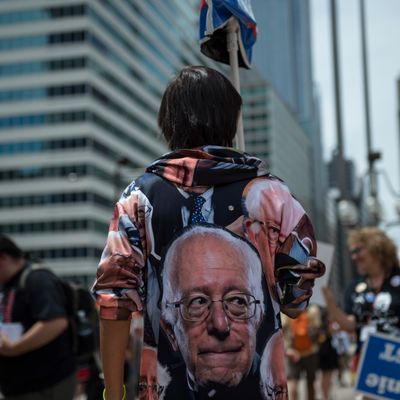
A lawsuit alleging that hacked emails proved the Democratic National Committee was so biased in favor of Hillary Clinton during the 2016 presidential nominating contest that it violated its own charter and defrauded donors was dismissed by a federal judge in Florida last weekend. But confusion over the ruling and the “admissions” supposedly made by the DNC’s attorneys has inflated rather than deflated the fury of hard-core Bernie Sanders supporters who had been following the suit avidly.
The ruling was actually made on a motion to dismiss the suit by the DNC. Thus the legal standard involved was whether the plaintiffs had standing to sue and a compelling claim to make if everything in its original complaint were true. So in arguing on that basis, the DNC wasn’t actually admitting it was biased and the judge wasn’t agreeing with the alleged facts, either.
As the Washington Post’s David Weigel reports, the plaintiffs themselves, who brought the suit to vindicate the “DNC rigged it all for Hillary” claim, tried to clear up the misunderstanding over the disposition of the suit:
[Co-plaintiff Elizabeth] Beck found herself in a strange position — telling an interviewer that he was giving her lawsuit too much credit. The language in the dismissal that assumed the plaintiffs’ arguments was not, in itself, admission that the DNC had rigged primaries.
“The court is obligated to take all those allegations as true. I would point out that the court is not saying that those allegations are true,” she told Jay. [Co-plaintiff] Jared Beck performed some of the same cleanup after the Observer falsely reported that the judge “reaffirmed that the primaries were tipped in Hillary Clinton’s favor.”
But the Becks are lawyers, and a lot of the impassioned Sanders supporters aren’t. Many of them are now more infuriated than ever at a party that’s supposedly admitting its sins but sloughing off any consequences.
After [Judge] Zloch dismissed the suit, Sanders supporters and progressives flocked to the DNC Fraud Lawsuit’s Facebook page to voice their grievances and express their frustrations with the Democratic Party. While some pledged to never donate money to the DNC ever again, others promised to bail on the party and support other candidates.
What makes the saga frustrating is that the determination of so many of the People of the Bern to pin legitimate grievances about the nomination process on the DNC flies in the face of some basic facts. Weigel succinctly sums them up:
Some DNC staffers were hostile to Sanders, especially in the final stretch of the primaries; the best evidence of how this hurt him was not in the hacked email, but in the fact that the DNC scheduled only a few, late primary debates for Clinton’s rivals to climb onto a stage with the front-runner. The events that did the most to anger Sanders supporters, like New York’s early voter registration deadline, Brooklyn’s voter roll purge, and a debacle that created long lines for voting in Arizona, were produced by state government and elections officials, not by the DNC.
Given the relative performance of the two major candidates in the debates that were held, it’s by no means certain more of them would have helped Sanders, who in the end hardly needed the exposure. And while you can make all sorts of good arguments against the state primary rules that helped Clinton or hurt Sanders in this or that state, and make a case for their prospective modification (though the many GOP-controlled state legislatures involved probably would not listen), it’s absurd to claim following existing state laws constituted a conspiracy. That’s particularly true with respect to the common Sanders campaign complaints about closed primaries, which until very recently the more ideologically motivated Democratic progressives tended to favor — just as Republican conservatives still do.
You really cannot change the rules right in the middle of the game, which is what many Sanders supporters suspected the DNC of doing even as the largely incompetent national party, whose power is regularly overestimated, defended the existing rules in all their irrational glory.
Arguments over the nominating process are never-ending, and it appears the Unity Reform Commission created at the 2016 Democratic Convention to adjudicate complaints about it is getting bogged down in the usual murky waters. As a practical matter, the only way state Democratic parties can get rid of closed primaries without the cooperation of state governments is to adopt even-less-democratic caucuses, where small elites really do call the shots. That may be all right with Sanders supporters still grinding axes over 2016, since Bernie did well in caucuses overall. But it’s an illogical position for those wanting to open up the party to larger participation, and pursuing it is probably a waste of time, like the continuing preoccupation with the DNC as though its puffed-up pretensions are as real as the evil powers attributed to it by its detractors.






























